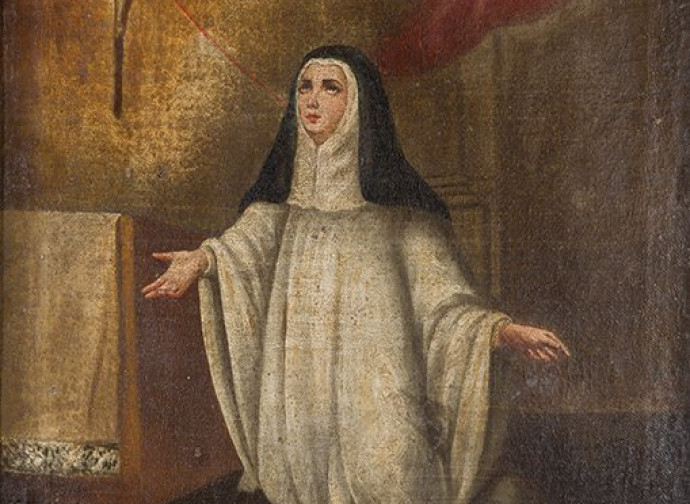Saint Lutgarde
Famous for her mystical gifts, the Belgian saint Lutgarde (1182-1246) was a precursor of devotion to the Sacred Heart of Jesus. She received numerous revelations about souls in Purgatory, for whom she offered many of her prayers.

Famous for her mystical gifts, the Belgian saint Lutgarde (1182-1246) was a precursor of devotion to the Sacred Heart of Jesus. She received numerous revelations about souls in Purgatory, for whom she offered many of her prayers.
She was born in Tongeren (Tongres, in French) to a rich family. At the age of 12 she entered a Benedictine monastery after her parents had lost her dowry in a failed business venture. The beautiful Lutgarde loved worldly things above all, such as beautiful clothes, and in her early days in the convent she showed no great attraction to religious life, to which she did not feel called. But around the age of 17 a supernatural event changed her radically. While she was in the visiting room, Jesus appeared to her with His open wound in His side, in what is considered the first medieval vision of the Sacred Heart.
The nuns noted her devout turnabout, though some believed that it would not last long. Instead Lutgarde made the solemn profession of her vows, showing the depth of her change: she prayed for sinners, the sick, and the conversion of the Cathars. She meditated on the Passion of Jesus, participating with moving piety in his sorrows, so much so that her sisters saw her dripping blood from her forehead during one of her ecstasies. Visions of Our Lady and St. John the Evangelist, stigmata and levitations are among her other mystical experiences, which were accompanied by the love she felt for the souls in Purgatory.
Saint Lutgarde reported that she saw Innocent III (1161-1216) enveloped in the flames of Purgatory, condemned to remain there until the day of Judgement if prayers were not offered in his suffrage. The pontiff told her that he was in that condition because of three serious sins, of which he only reported the first: lacking humility, he had never wanted to bow his head during the recitation of the Creed, at the act of remembrance of the Incarnation of Our Lord. Innocent told Lutgarde that he had been saved from Hell because of his devotion to the Blessed Virgin. The late pope thanked the saint for all the prayers and sacrifices she offered for his pontificate, which also had important merits, such as the contrast to the Cathar heresy and the approval given orally to St. Francis for his new Order. Four centuries later Saint Robert Bellarmine commented: “If a Pope so worthy of praise [...] finds himself subjected to the most terrible torments until the Day of Judgment, what prelate does not tremble?”.
In the meantime, after declining the offer to become prioress, Lutgarde had gone to live in the Cistercian monastery of Aywières (not far from Liège) at about 26 years of age, in search of greater communion with God. She supported with fasting and prayer the action of the first Franciscans and Dominicans, who called her “Mother of Preachers”.
In a vision, Jesus asked her if she desired any particular grace. She asked if she could understand Latin better, to benefit from all the power of the Word of God and to raise her praise to Him in the choir: she was inundated with the richness of the Psalms, the Prophets, the Gospel, but she still experienced a feeling of emptiness. In the end she asked Jesus if she could exchange that gift for another: “And what would you exchange it for?” Christ replied. “Lord, I would exchange it for your Heart.” It was then that the exchange of hearts with Jesus took place, according to an experience common to other great saints. She lived in blindness the last 12 years of her life, in which she performed healings and prophecies. The Lord announced to her the date of her death, which took place on 16 June 1246, the day after the feast of the Most Holy Trinity. Her first biography was written less than two years later by the Dominican theologian Thomas of Cantimpré (1201-1272), who was a pupil of Saint Albert the Great.
Patroness of: blind people, disabled people, Flanders


